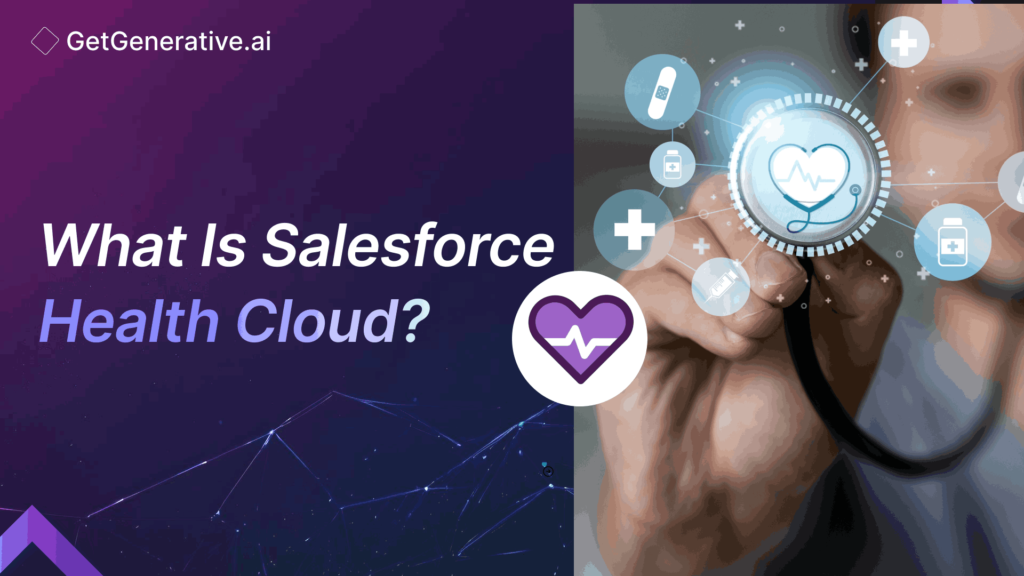What Is Salesforce Health Cloud?
According to recent statistics, the global healthcare CRM market is expected to reach $30.7 billion by 2030, growing at a CAGR of 8.4% from 2023 to 2030. This significant growth underscores the increasing adoption of advanced CRM solutions like Salesforce Health Cloud in the healthcare industry.
What is Salesforce Health Cloud?
Salesforce Health Cloud is a comprehensive, cloud-based customer relationship management (CRM) platform designed for the healthcare industry. It provides a 360-degree view of patient data, enabling healthcare providers to deliver personalized care, improve patient engagement, and streamline administrative processes. Built on the robust Salesforce platform, Health Cloud leverages advanced technologies such as artificial intelligence and analytics to offer insights and drive better decision-making in healthcare organizations.
Key features of Salesforce Health Cloud include:
- Patient profiles with complete medical histories
- Care coordination tools
- Patient engagement capabilities
- Analytics and Reporting
- Integration with electronic health record (EHR) systems
- Customizable workflows
- Mobile Accessibility
How does Salesforce Health Cloud improve patient outcomes?
Salesforce Health Cloud plays a pivotal role in improving patient outcomes through several mechanisms:
- Enhanced care coordination: By providing a unified view of patient data, Health Cloud enables care teams to collaborate more effectively, ensuring that all members are aligned on treatment plans and patient needs.
- Personalized care plans: The platform’s analytics capabilities allow healthcare providers to develop tailored care plans based on individual patient data, medical history, and preferences.
- Proactive patient engagement: Health Cloud’s communication tools facilitate timely interactions between patients and providers, promoting better adherence to treatment plans and early intervention when issues arise.
- Improved access to information: Patients can easily access their health information, appointment schedules, and educational resources through patient portals, empowering them to take a more active role in their healthcare.
- Risk stratification: The platform’s advanced analytics help identify high-risk patients, allowing providers to prioritize interventions and allocate resources more effectively.
- Continuity of care: Health Cloud ensures seamless transitions between providers and care episodes by centralizing patient data and making it accessible across different care settings.
What are the main benefits of using Salesforce Health Cloud for healthcare providers?
Implementing Salesforce Health Cloud offers numerous benefits for healthcare providers:
- Improved operational efficiency: By automating routine tasks and streamlining workflows, Health Cloud reduces administrative burden and allows healthcare professionals to focus more on patient care.
- Enhanced patient satisfaction: The platform’s patient engagement tools and personalized care capabilities improve patient experiences and raise satisfaction rates.
- Better data-driven decision-making: Health Cloud’s robust analytics and reporting features provide valuable insights that inform clinical and operational decisions.
- Increased revenue: Healthcare providers can boost their revenue streams by optimizing scheduling, reducing no-shows, and improving patient retention.
- Scalability: As a cloud-based solution, Health Cloud can easily scale to accommodate growing patient populations and expanding healthcare organizations.
- Collaborative care delivery: The platform facilitates better communication and coordination among care team members, leading to more cohesive and effective care delivery.
- Regulatory compliance: Health Cloud is designed to meet stringent healthcare regulations, helping providers maintain compliance with industry standards.
How does Salesforce Health Cloud ensure data security and compliance?
Data security and compliance are paramount in healthcare, and Salesforce Health Cloud addresses these concerns through several robust measures:
- HIPAA compliance: Health Cloud is designed to meet the Health Insurance Portability and Accountability Act (HIPAA) requirements, ensuring the protection of sensitive patient health information.
- Encryption: The platform uses advanced encryption techniques to secure data at rest and in transit.
- Role-based access control: Health Cloud implements granular access controls, ensuring users can only access the information necessary for their roles.
- Audit trails: The system maintains detailed audit logs of all data access and modifications, supporting compliance and forensic investigations.
- Regular security updates: Salesforce constantly updates its security measures to address emerging threats and vulnerabilities.
- Data backup and recovery: The platform includes robust backup and disaster recovery capabilities to ensure data integrity and availability.
- Compliance with global regulations: Health Cloud is designed to meet various international data protection regulations, such as GDPR, making it suitable for global healthcare organizations.
Also Read – Salesforce Health Cloud Implementation Guide
Can Salesforce Health Cloud integrate with existing EHR systems?
Yes, Salesforce Health Cloud is designed to integrate seamlessly with existing Electronic Health Record (EHR) systems. This integration capability is crucial for healthcare providers who have already invested in EHR solutions and want to leverage the additional benefits of Health Cloud without disrupting their current workflows.
Key aspects of Health Cloud’s EHR integration include:
- Bi-directional data synchronization: Health Cloud can pull data from and push data to EHR systems, ensuring that information is always up-to-date across platforms.
- HL7 and FHIR support: The platform supports industry-standard healthcare data exchange protocols, facilitating smooth integration with a wide range of EHR systems.
- API-based integration: Salesforce provides robust APIs, allowing custom integrations with various EHR systems and other healthcare technologies.
- Pre-built connectors: Salesforce offers pre-built connectors for popular EHR systems, simplifying the integration process.
- Data mapping and transformation: Health Cloud includes tools to map and transform data between different systems, ensuring data consistency and accuracy.
- Real-time updates: The integration can be configured to provide real-time updates, ensuring that care teams can always access the most current patient information.
- Customizable integration workflows: Healthcare providers can tailor the integration to match their specific workflows and data requirements.
What are the different pricing models available for Salesforce Health Cloud?
Salesforce Health Cloud offers flexible pricing models to accommodate the diverse needs of healthcare organizations. While specific pricing details may vary and are subject to change, the general pricing structure includes:
- Per-user, per-month licensing: This model allows organizations to pay based on the number of users accessing the system.
- Enterprise-wide licensing: Larger healthcare organizations may opt for enterprise-wide licensing, which provides access to broader features and unlimited users.
- Tiered pricing: Salesforce often offers different tiers (e.g., Essentials, Professional, Enterprise, Unlimited) with varying feature sets and pricing levels.
- Add-on modules: Additional functionalities or modules can be purchased separately to enhance the core Health Cloud platform.
- Custom pricing for large implementations: Salesforce may offer custom pricing based on the organization’s specific needs and scale for extensive deployments.
- Non-profit pricing: Eligible non-profit healthcare organizations may qualify for discounted pricing through Salesforce.org.
- Free trial periods: Salesforce typically offers free trial periods, allowing organizations to evaluate Health Cloud before committing to a purchase.
Conclusion
Salesforce Health Cloud represents a significant leap forward in healthcare technology, offering a comprehensive solution that addresses many of the challenges modern healthcare providers face. By providing a unified platform for patient relationship management, care coordination, and data-driven insights, Health Cloud empowers healthcare organizations to deliver more personalized, efficient, and effective care.
Enhance your Salesforce consulting with GetGenerative.ai. Effortlessly craft outstanding proposals, enabling you to dedicate more time to providing exceptional client service.
Start today!
FAQs
1. What is Salesforce Health Cloud?
A comprehensive CRM platform designed specifically for healthcare providers.
2. How does Health Cloud improve patient outcomes?
By enhancing care coordination, personalizing care plans, and improving patient engagement.
3. Is Health Cloud HIPAA compliant?
Yes, Health Cloud is designed to meet HIPAA requirements.
4. Can Health Cloud integrate with existing EHR systems?
Yes, it offers seamless integration with various EHR systems.
5. What pricing models are available for Health Cloud?
Options include per-user licensing, enterprise-wide licensing, and tiered pricing models.




